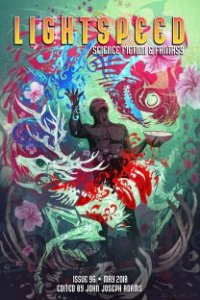Cecelia Holland reviews Guy Gavriel Kay
 Guy Gavriel Kay, hunting in the twilight zone between fact and dream, has written a shimmering novel, a fantasia on T’ang China, the epitome of Chinese civilization, as beautiful and as alien as the rings of Saturn.
Guy Gavriel Kay, hunting in the twilight zone between fact and dream, has written a shimmering novel, a fantasia on T’ang China, the epitome of Chinese civilization, as beautiful and as alien as the rings of Saturn.
Midway through the Ninth Dynasty, as Kay dubs it, Shen Tai, younger son of a distinguished general of Kitai, has chosen to mourn his father’s death by returning to the scene of a great battle and burying the bones scattered there of the hundred thousand dead. Alone in the mountains, the screams and moans of the dead ringing through the nights, he remembers the glories of Xinan, capital of Kitai; during the day, grown used to the ghosts, he buries their bones.
For this filial piety he is rewarded, first, by a mindfulness and sense of balance that serve him vitally in the time to come. And, second, by the gift of 250 of the magnificent horses bred only in Central Asia.
How this gift involves Tai in the spiderweb of intrigue at the center of the Empire is the subject of Kay’s novel. His glancing, indirect style suits this matter perfectly; as Tai leaves the mountains to go to Xinan, capital of the Empire, the sense heightens of looking around corners, of second-guessing and deception, and Tai needs all his balance and presence of mind to keep upright in a torrent of collapsing allegiances.
Kay weaves his story through with the pervasive value of poetry in Chinese culture, the power of ritual and the extremity of mannerism, the violence under the brilliant jade and gold. The court is exquisitely drawn, like something out of the Red Chamber, or the Tale of Genji. Everything happens with the subtlety of a glance, a bright red fingernail, until Tai’s arrival, and the promise of his horses, tips the balance of the Empire into chaos.
What is this, other than a beautiful, compulsive read and an excuse for a crash course in T’ang China? Perhaps an instruction on the necessity of style itself, of balance, of self-awareness, discipline, proportion. As a counterweight to the Xinan court and Kitan countryside, Kay carries out a sideplot into the wild lands outside the Long Wall, where the grassland itself murmurs, and a man can be half-wolf. Without the grace of manners and values this is what happens to you.
Above all he plays with time, speeding up and slowing down, building scenes sometimes from the front backward, sometimes out of order, shifting between past tense (for Tai) and present tense (for his sister, in the wild land, mostly). ‘‘The past isn’t locked into a given time,’’ Kay says, in a note at the beginning, and Under Heaven could be what he means: this is the pattern, once again, and this, the only way to deal with it.








Pingback:Tweets that mention Locus Online Reviews » Cecelia Holland reviews Guy Gavriel Kay -- Topsy.com